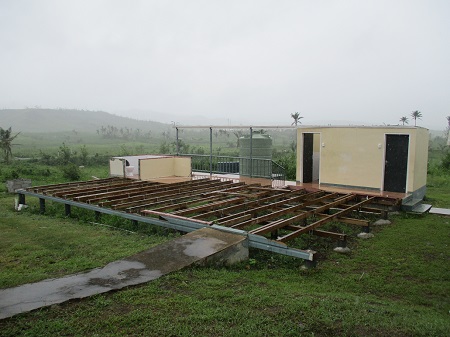The widespread destruction left by Tropical Cyclone Winston is evident in Fiji, but less visible is the psychological and emotional trauma inflicted by the category 5 storm that swept the country nearly two months ago.
District Nurse Asenaca Rika, her two young children and some local families watched the cyclone tear apart a building at her nursing station and blow heavy debris into the staff quarters where they were taking refuge. The experience has left her feeling anxious whenever there is rain and wind.
“It was really terrifying,” said nurse Rika. “It was really loud and I was worried about my kids….We had lots of injured and two deaths….I’ve been affected psychologically.”

The need for psychosocial support was identified as a priority immediately after the cyclone, which claimed 44 lives, injured over 125 people and left thousands without shelter, food and clean water.
The World Health Organization (WHO) supported the Ministry of Health and Medical Services in training health workers to teach others how to give Psychological First Aid (PFA) to people affected by the cyclone. PFA is an approach that reaches out to people in need of support, helping them address their basic needs, listening and comforting them, and connecting them with information, services and social support that can help them.
Since then, with help from other partners, 779 health staff, community leaders, teachers and volunteers were trained to give psychological support and over 11 246 people have received counselling services.
Nurse Rika received the training and used it to help deal with her experience.
“After sharing my experience, I felt relieved,” she said. “I take one thing at a time and take time for breaks, and I talk about it and don’t keep it to myself.”
Following the lessons of the training, she has given PFA to many patients, including a family she counsels regularly with six children who lost their mother in the cyclone.
“It’s challenging,” she said. “You need a heart full of compassion.”
PFA encourages positive coping strategies that include:
- getting enough rest
- eating healthy and drinking water,
- doing physical exercise,
- spending time with family and friends,
- sharing the experience with someone who is trusted, and
- doing things that promote relaxation.
The Ministry of Health and Medical Services leads a sub-cluster group on mental health and psychosocial support to coordinate efforts with all partners involved in the disaster response. The Ministry of Health and Medical Services continues to communicate mental health advice to the public through radio messages and other means, as it has been doing since the cyclone hit.
The need for psychosocial support in Fiji is expected to continue. Just as it will take time to rebuild the physical damage caused by Cyclone Winston, so will the psychological and emotional health of those affected.
